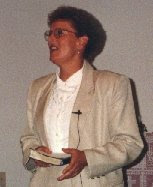The "Emergent" or "Emerging" church is an ecumenical movement within the Christian church that focuses on rethinking theology within the cultural context of Postmodern culture. This movement strives for "greater mutual respect, tolerance, and cooperation between the world religions". In other words, it smacks of "one-world religion"!
If you're over age 35, your spiritual health may be at risk in that new "church movements" are focusing in on primarily "GenXrs." You may not have even heard of the latest, the "Emergent Church" or "Emerging Church." Many today are looking for a new "methodology," "new wave," or "new thing God is doing." I ask, "What is wrong with the old way?" Apparently just the Bible is no longer sufficient.
Some say the "Emergent Church" (EC) is the next step beyond the "seeker movement." Leaders of the EC say they have answers for our generation even though it focuses on experience much more than the Bible. But leaders of the movement insist that in our fast-changing culture, something is happening. What was once a Christian nation with a Judeo-Christian worldview is becoming a post Christian, unchurched, unreached nation. There is arising in our midst new generations without any Christian influence, and thus we must re-think everything we have done with Christianity over many centuries. Part of what they say is true and their evangelistic fervor is genuine no doubt.
Defining the EC is a little bit like nailing jello to the wall, but here goes anyway. It relies heavily on mysticism, a great danger to believers of all denominations. Some leaders will tell you that you cannot know truth. An EC service will often meet in homes, and will rely on extra-biblical paraphernalia, extra-sensory images, sounds, smells of candles and incense, silence, mystical meditation, making the sign of the cross, touching icons, statues of saints, rosary beads for Protestants, liturgy, yoga-like deep breathing, contemplative prayer, and sacraments--all for a full sensory immersion with the divine. In other words, they are looking for an encounter with the Lord using all their senses. Worship is stressed, but some would say more than the Word.
They borrow liturgical practices from the Orthodox, Lutheran, and Catholic Church and heavily from the traditions and views of Catholic Church Fathers.
It would seem to me that if the Bible were being taught, the extra-biblical paraphernalia, extra-sensory images, sounds, smells, etc., would hardly be necessary, but maybe I'm making much ado about nothing.
The most visible leader is Brian McClaren whose book, "A Generous Orthodoxy" has caught on all over. In it he states that, "The Christian faith should become a welcome friend to other religions of the world, and not a threat." He states in the book that not all people need to be Christians to follow Jesus. Some may be able to be "Buddhist or Hindu followers of Jesus." He also states that, "God is interested in not only saving us from consequences after this life but in saving us from injustice, oppression, greed, and war, in this life." He was uninvited as a speaker at the Kentucky Baptist Convention when leaders learned McClaren suggested that people could be saved without being Christians.
Others either in the EC movement or supportive of it include Robert Schuller, Richard Foster, Brennan Manning, Dan Kimball, Bill Hybels, Dallas Willard, Bruce Wilkinson, Eugene Peterson, John Ortberg, John Eldredge, Dr. Robert Webber, Tony Campolo, Rick Warren, and dozens of lesser-known people.
While the movement is ecumenical and attracts numbers and particularly youthful followers, it hardly seems biblical when so much involves the extra-biblical.
Thursday, January 8, 2009
"Emergent Church" is Satan's Deception by By Jan Markell
Subscribe to:
Post Comments (Atom)




No comments:
Post a Comment